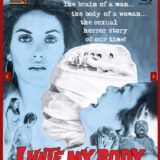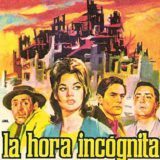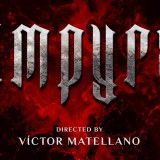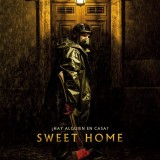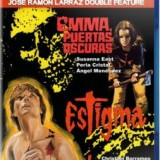REVIEW: POPPERS (1984)
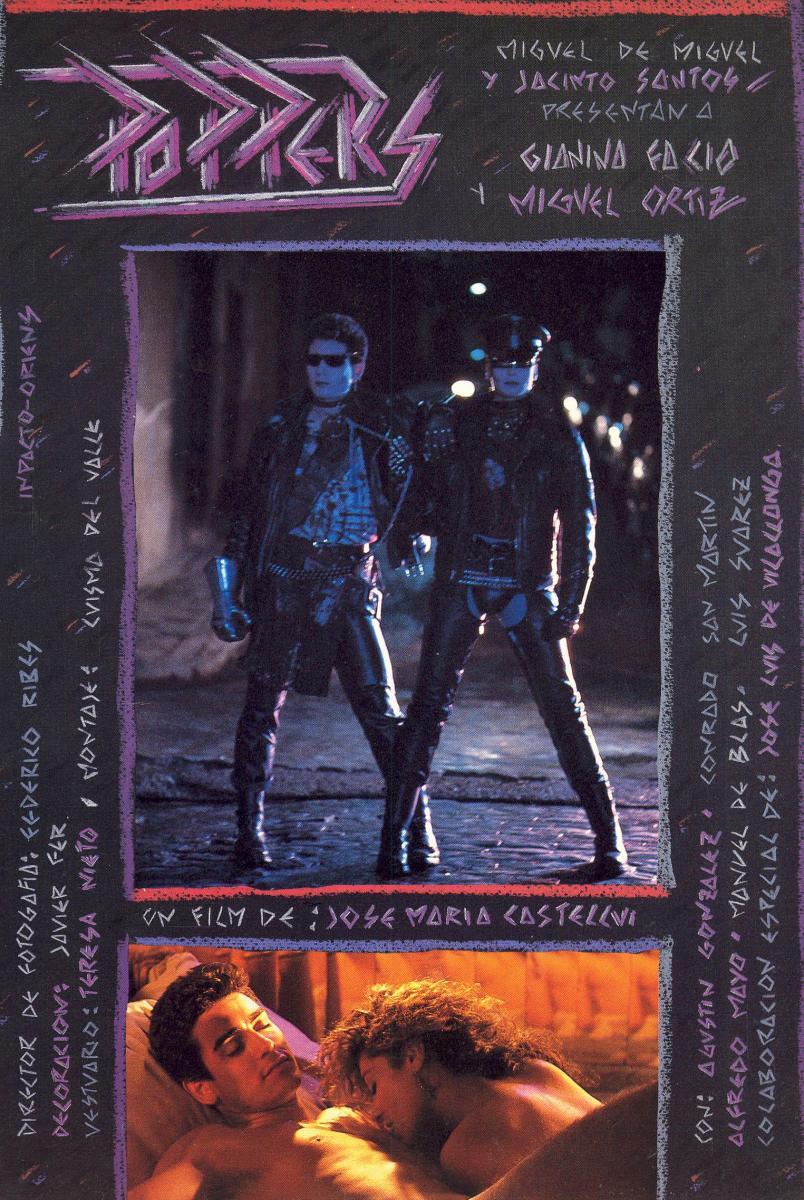
By Rubén Íñiguez Pérez (*)
In these nostalgic times for the 80s, it doesn’t seem risky to dig up from oblivion a movie where the synthesizer sets the rhythm of its soundtrack. Although it’s not impossible to find it, POPPERS (José María Castellví, 1984) has become almost an unknown film, rarely mentioned as a classic of bizarre Made-in-Spain cinema.
The reviews found by searching Google are few or of little value; only a critique written by Octavi Martí at the time of its release [1], to which reference will be made throughout the text, holds interest—the rest of the references are usually brief comments in boards simply discussing its oddity or rankings of strange films from our cinema. But what is the reason for this oblivion? Difficult to say. The first thought might be that it’s just a bad movie, and there would be good reasons to agree with this argument, but its premise is so insanely absurd that it could be adored by fans of cheesy films—worse things have been written about a young man is released from his sentence for murder thanks to the victim’s father, who frees him from jail to turn him into the prey of a hunt organized by a group of powerful but vengeful characters with little sense of morality. Aside from this, as previously mentioned, it is not impossible to find, and on top of that, it features a known cast: Agustín González, Conrado San Martín, Alfredo Mayo, or Manuel de Blas—it’s worth mentioning that it was the film debut of Miguel Ortiz and Giannina Facio, the future partner of Ridley Scott, who appeared in films like Gladiator, Hannibal, or Prometheus.
But let’s stop wondering why it was forgotten and travel back to 1984 when POPPERS was premiered [2], when *El País* published a critique titled “Zambombas y semáforos.” Despite containing many spoilers, Octavi Martí nails it by pointing out many of the elements that caused the film to fail, among which the tone employed by the director stands out: “José Maria Castellví gave up on filming a remake with the evil Zaroff and the parodic Doctor Phibes, adding humor where seriousness would have been better, and vice versa.” Perhaps this was the main cause of its many problems; the audience couldn’t quite understand if what they were watching was serious or if it was a joke. On one hand, it’s a brutish action and revenge story, very much of its time, meant purely for enjoyment; but on the other hand, there’s a certain mockery of the upper classes and their double standards, represented by eccentric rich people addicted to all kinds of perversions—a world that Castellví must have known well, given that he worked as a photographer for several well-known figures from the showbiz world [3]. A significant example of this mockery is a scene that works as a rather simplistic antithesis: a TV news report informs of the death of one of these powerful people, portraying him as an honorable and exemplary man, an image far from reality, as the prey kills the character he was trying to hunt.
The theme of youth delinquency is also present, a topic that was very trendy in Spanish cinema thanks to directors like Eloy de la Iglesia, among others; in fact, many moments in POPPERS seem to be inspired, albeit loosely, by the hand of the Basque filmmaker.
But it’s not just the tone that’s off. Its development must have left many viewers puzzled. Without giving away too many spoilers, for example, it’s unbelievable how easily Santos (Miguel Ortiz) convinces Lola (Giannina Facio) to help him in his revenge plan—especially since she goes from “I won’t tell you anything” to “Now I’ll tell you everything” in the blink of an eye. This last character also raises another why, in this case concerning her inclusion, as she practically adds nothing to the plot. Her role, clearly gratuitous, is to heat the heterosexual male audience, which wasn’t too difficult given the lack of female presence and the film’s homoerotic and sadomasochistic aesthetic—not to discredit the eroticism the actress exudes in some scenes. And yes, it’s not hard to deduce that the film is somewhat misogynistic, as Martí notes: “In a strictly masculine world, of that masculinity that denies the existence of women, except through cross-dressing.”
Considering this, Martí’s other statement doesn’t seem far-fetched: “It’s a film made to launch Giannina Facio into cinema and turn her from a beauty salon heroine into a screen diva.” The movie was probably already written before considering the Costa Rican actress. Still, given her popularity at the time [4], it’s no surprise that her character was given importance. However, she was shoehorned in—aiming at an audience that likely preferred to see her on the cover of gossip magazines such as Interviú or Hola rather than in a movie like this.
Whatever the case, neither the audience nor the critics connected with the film. However, that doesn’t mean that seen through today’s eyes by fans of bizarre cinema, it couldn’t be enjoyable. *Poppers* works narratively and structurally like a video game, where revenge becomes the goal of all its characters, whether to escape it or to exact it. A madness where scenes of pure sadomasochism and promiscuity follow one another—the characters seem to get excited by death—adorned with a voyeuristic perspective and post-punk aesthetic—typical of Madrid’s Movida—making it an ideal film to laugh with good company.
_________________________________________
[1] http://elpais.com/diario/1984/10/22/cultura/467247617_850215.html
[2] Regarding the dates and theaters where *Poppers* premiered, the Ministry of Education, Culture, and Sports website lists: 15-10-1984 Madrid: Princesa, Roxy A, Montera, Velazquez, Vergara, and Windsor B; 18-10-1984 Barcelona: Pelayo, Waldorf, Aquitania, Bailen.
[3] It’s not hard to find references online linking his name with Sara Montiel, Julio Iglesias, María José Cantudo, or Javier Mariñas, among others.
[4] Giannina Facio was a regular at jet-set parties, and her romance with Julio Iglesias made tabloid headlines—, coincidentally, Iglesias and Castellví worked together in those years and were very good friends. Days after the release of *Poppers*, she was arrested by the Civil Guard at Barcelona’s El Prat Airport while attempting to leave the country with a briefcase containing 343,000 pesetas, a sum much higher than the legal limit at the time, which was 50,000 pesetas: http://elpais.com/diario/1984/10/26/ultima/467593202_850215.html
________________________________________________________________________
 Rubén Íñiguez Pérez is a Spanish literature scholar. He has written different articles about horror cinema for several media and he is part of the headquarters of La Mano Film Festival.
Rubén Íñiguez Pérez is a Spanish literature scholar. He has written different articles about horror cinema for several media and he is part of the headquarters of La Mano Film Festival.
Translated from https://spasmoblog.wordpress.com/2017/09/28/poppers/ with the author’s permission.





